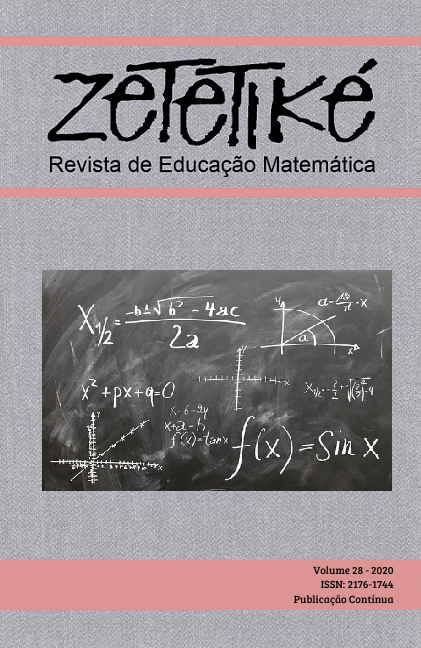Abstract
This article is an integral part of a doctoral study conducted on the articulations between transdisciplinary elements and teaching practices related to teaching statistics in the final years of elementary school. We sought to describe and analyze the possible approximations between Statistical Education and transdisciplinary studies, understanding their potentialities in the practices mobilized by teachers. Emerged analyzes from the teaching conceptions that were evidenced in the episodic interview, answered by two graduated participants in Mathematics from the city of Canela / RS. We apply the data analysis method called Discursive Textual Analysis (ATD), being a qualitative and comprehensive approach. The conclusions indicate that there are links between transdisciplinary indicators and teaching practices that permeate the professional dimension and achieve a transdisciplinary attitude that can occur through transcendence and learning to learn.
References
Barbosa, D. (2005). A atitude transdisciplinar na educação escolar. In: Triaça, Amâncio. et al. (Orgs.), Educação e Transdisciplinaridade III (pp. 314-361). São Paulo: Triom.
Begg, A. (1997). Some emerging influences underpining assessment in statistics. In GAL, I.; GARFIELD, J. (Org.). The assessment challenge in statistics education (pp. 1-9). Amsterdam: IOS Press.
Borba, R. et al. (2011). Educação estatística no ensino básico: currículo, pesquisa e prática em sala de aula. EM TEIA – Revista de Educação Matemática e Tecnológica Iberoamericana, Pernambuco, 2, (2). (s/p). Disponível em: https://periodicos.ufpe.br/revistas/emteia/article/view/2153/1722
D’Ambrosio, U. (1997). Transdisciplinaridade. São Paulo: Palas Atena.
Flores, J. F., Rocha Filho, J. B., & Samuel, L. R. S. (2014). The big-bang theory e os mitos da criação: uma explosão que produz deus. In Fortim, I. (Org.) The big-bang theory e a psicologia (pp. 44-66). São Paulo: Homo Ludens.
Garfield, J. & Gal, I. (1999). Assessment and statistics education: current challenges and directions. International Statistical Review, 67, (1), 1-12. Disponível em: https://onlinelibrary.wiley.com/doi/abs/10.1111/j.1751-5823.1999.tb00377.x
Graham, A. (1987). Statistical investigations in the secondary school. Cambridge: The Open University Centre for Mathematics Education.
Holmes, P. (1980). Teaching Statistics. Slough: Foulsham Educational.
Leti, G. (2000). The birth of statistics and the origins of the new natural science. Metron - International Journal of Statistics, Dipartimento di Statistica, Probabilità e Statistiche Applicate - University of Rome, 0, (3-4), 185-211.
Lopes, C. A. E., Ferreira, A. C. (2004). Anais do VIII Encontro Nacional de Educação Matemática (pp.1-30). Retirado em 18 de maio, 2015, de: http://www.sbem.com.br/files/viii/pdf/13/MR10.pdf.
Machado, C. P. (2016). Indicadores de transdisciplinaridade: ensaio da identificação e evidências na narrativa e atuação de professores de ciências e matemática. Tese de doutorado em Ensino de Ciências e Matemática. Porto Alegre: Pontifícia Universidade Católica do Rio Grande do Sul. Retirado em 20 dezembro de 2018, de: http://tede2.pucrs.br/tede2/handle/tede/7218.
Ministério da Educação (MEC). (1997). Secretaria de Educação Fundamental. Parâmetros Curriculares Nacionais. Brasília: MEC/SEF.
Ministério da Educação (MEC). (1998). Secretaria da Educação Básica. Parâmetros Curriculares Nacionais. Brasília: MEC/SEF.
Ministério da Educação (MEC). (2002). Parâmetros Curriculares Nacionais. Ensino Médio: orientações educacionais complementares aos parâmetros curriculares nacionais – Ciências da Natureza, Matemática e suas tecnologias. Brasília: MEC/SEMT.
Ministério da Educação (MEC). (2017). Secretaria da Educação Básica. Base Nacional Comum Curricular (BNCC). Brasília: Ministério da Educação. Disponível em: http://basenacionalcomum.mec.gov.br/images/BNCC_EI_EF_110518_versaofinal_site.pdf
Moraes, M. C. (2007). A formação do educador a partir da complexidade e da transdisciplinaridade. Diálogo Educativo, 7, (22), 13-38.
Moraes, M. C. (2014). Ludicidade e transdisciplinaridade. Revista Entreideias, 3(2), 47-72.
NCTM. National Council of Teachers of Mathematics (2011). Principles and Standards for School Mathematics: Math Standards and Expectations.
Portilho, M. S. B., & Crema, R. (2017). Ser integral: as tessituras do bordado em espiritualidade e educação. INTERESPE, (9), 24 - 40. Disponível em: https://revistas.pucsp.br/interespe/article/view/35360/24200.
Santo, R. C. E. (2003). Pedagogia da transgressão. São Paulo: Papirus.

This work is licensed under a Creative Commons Attribution-NonCommercial-NoDerivatives 4.0 International License.
Copyright (c) 2020 Zetetike


